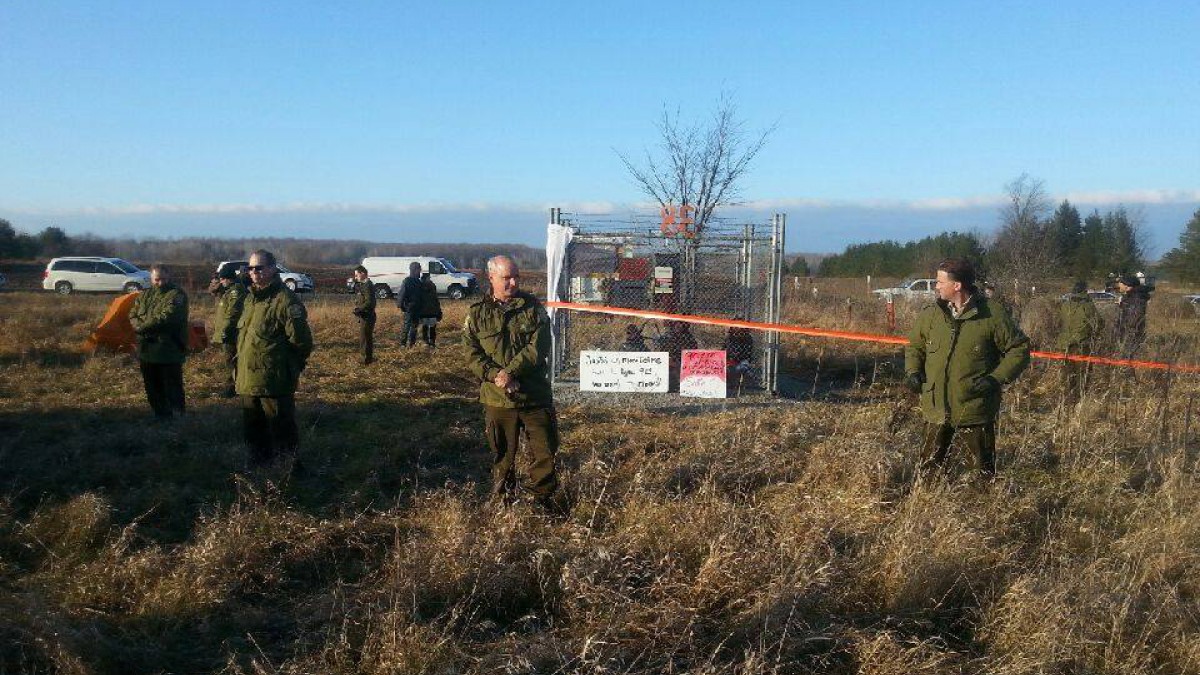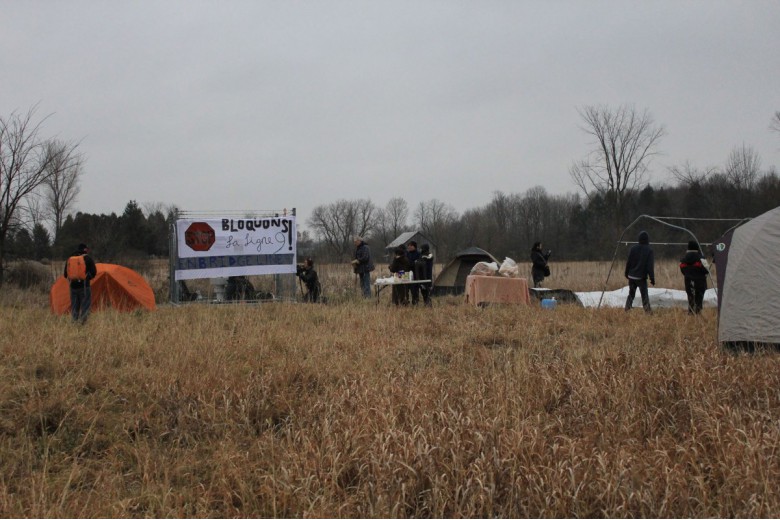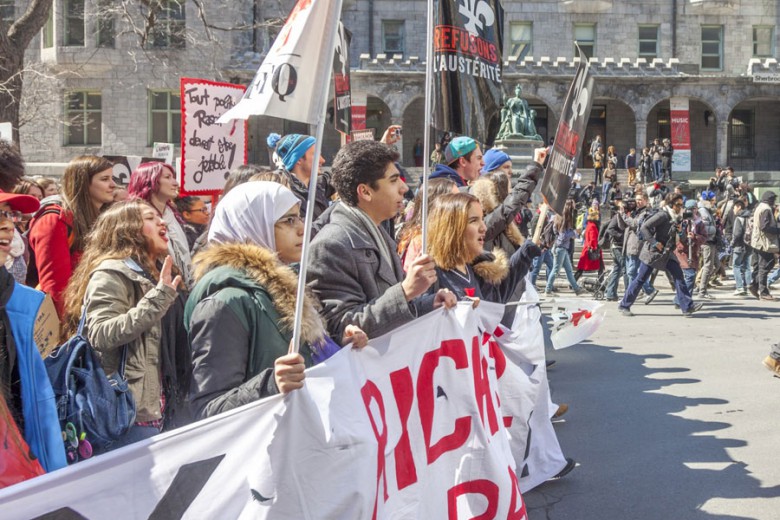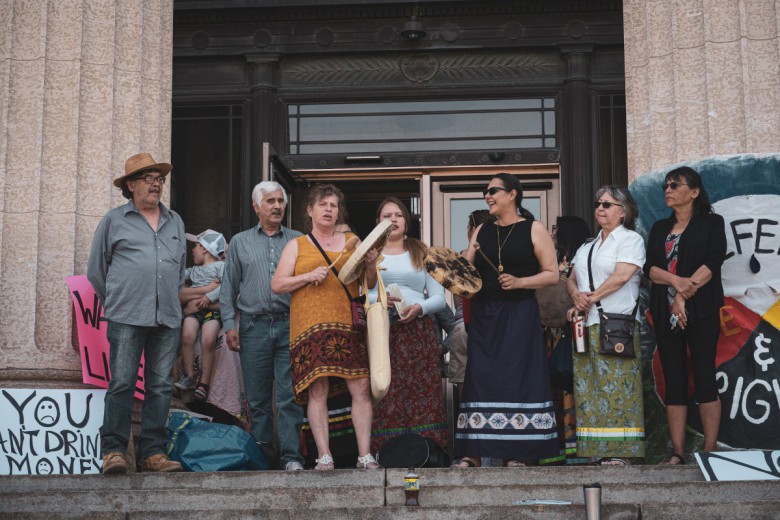A group of activists shut down the Line 9 pipeline at the Quebec-Ontario border on December 7, 2015. Briarpatch published a first-hand account of the day’s events, written by “Will,” one of the activists involved in the action.
Line 9 is a 40-year old pipeline that, as of December 3, is transporting western crude oils, including tar sands bitumen, to eastern refineries and ports. The pipeline goes through 18 Indigenous communities, many of whom assert that they have not been adequately consulted, neither 40 years ago at the time of original construction nor now. The project has faced a court challenge from the Chippewa of the Thames First Nation and strong opposition from municipalities and activists, resulting in considerable delays.
Though Enbridge’s Line 9 has begun flowing, the opposition hasn’t stopped. Two weeks after the action Will was involved in, activists hundreds of kilometres west in Anishanaabe territory near Sarnia, Ontario, again stopped the flow of Line 9 (video). The three women leading this action, Vanessa Gray, Sarah Scanlon, and Stone Stewart, used the same method of manually closing a pipeline valve accessible above ground. In addition to the direct actions, Rachel Thevenard is running the length of the pipeline route to raise money for the Chippewa’s court challenge, and 80 groups have signed a letter asking Prime Minister Trudeau to halt and re-assess Line 9.
I caught up with Will and asked him to reflect further on those events and to put them in context. Here’s our conversation:
David: What reflections, beyond those in your account of events on December 7th, do you have on the Line 9 direct action you were involved in?
Will: It was a great success, in that we come out of it feeling stronger than we went into it. We’re anarchists, and we see struggles against pipelines as a part of a broader struggle.
We fight for the terrain of the imagination. If our action inspires others, if it causes them to see resistance as viable, if it causes them to brainstorm new tactics, we will be content that we are contributing to a great drama, a story that does not begin or end with us.
The value of this struggle lies not only in its immediate aims, but in its ability to bring people together in the spirit of defiance, creating a culture of resistance that will grow over the course of years. Eco-anarchism is a young movement in the east, and we would do well to evaluate the success of our actions by how well they prepare us for future moments of revolutionary potential.
We have ample proof that when enough people are sufficiently determined, they win. Look at the anti-fracking fight in Mi’kma’ki (NB), look at Northern Gateway, Pacific Trails Pipeline, Trans Mountain, KXL, Energy East, and the ports at Cacouna and the Port of Belledune.
Our project is nurturing that spirit of determination, and disseminating our ideas widely, so that they might take root where they will, so that as the effects of the age of crisis we live in become increasingly dire, a culture of resistance will emerge that is able to survive and thrive independent of the state and fossil fuel economy.
David: What do you think is the next step in opposing Line 9, and in stopping future pipelines?
Will: The movement has used every one of the master’s tools, and they’ve succeeded only in slowing the process down. The time for bold direct action has come.
This is a war of attrition, and we are wearing those bastards down. Our strategy was always to chisel away at the profitability of the tar sands by slowing them down, discouraging investment, affecting their bottom line, and blocking their access to tidewater. It will appear to some, when they look back on the great crash of the Athabasca Tar Sands, that it was the invisible hand of the market at work. Only those who have been paying close attention will know to what extent our movement was responsible for stopping the spread of this cancer.
When one sees this fight against the tar sands industry as a war of attrition, every act that interrupts business as usual is a victory. I think that it’s defeatist logic to see the fight against Line 9 as lost because it’s currently operational. Only someone trying to talk themselves out of taking action would think that we’ve exhausted all our options.
Stopping future pipelines will be far easier than Line 9. Because Line 9 was already in the ground, there were fewer sites of intervention, and this was also the first campaign of its kind in our bioregion. Our movement is growing, and will continue to grow as it becomes more and more obvious how deeply fucked we Earthlings are. It’s easy for me to predict that Energy East will never ship a single drop of oil from the east coast. You’ve been warned, investors.
David: How are you feeling about the charges you are facing?
Will: The charges I’m facing are no big deal. As far as I know, after years of intense struggle, no one has gone to prison for anti-pipeline activism. While I hope this is encouraging to those contemplating taking action, I’d add that activists fighting to win need to be prepared to do time. The consequences we face under Canada today are a joke compared to what revolutionaries in other parts of the world, and at other times in history, have had to deal with. I also feel very supported by an incredibly vibrant network of amazing people, which helps.
David: Anything else?
Will: To my comrades: I love you. It would be hard to capture in words the potency of the connection amongst human beings who share a vision that they are committed to realizing. Thank you for all your support, and keep up the fight! The time for action is now.







